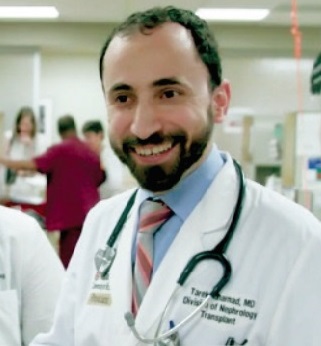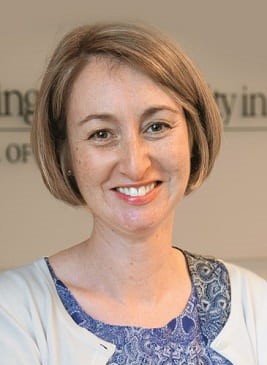
According to the Organ Procurement & Transplantation Network (OPTN) transplant database, nearly 91,000 individuals are currently waiting for a kidney or kidney/pancreas transplant, with an average wait time in most clinics being 3-5 years. In addition, the annual mortality rate of those waiting for a kidney is about 5% and increases greatly in the older population.
Needless to say, there is a critical shortage of kidneys and other solid organs available for transplantation.
Because of the shortage of organs and long wait times for transplantation, there is an increased interest in “non-standard” organs, such as those from patients infected with hepatitis C virus (HCV) or the Covid-19 virus, to help increase the organ pool. Once considered unusable, preliminary studies have shown positive outcomes for patients receiving these types of organs.
Tarek Alhamad, MD, MS, MBA, Associate Professor of Medicine, Division of Nephrology, and Medical Director of the Pancreas and Kidney Transplant Program at Washington University/Barnes-Jewish Hospital, and colleagues have examined the patient risk of using this underutilized pool of kidneys. Two recently published studies describe the use of kidneys from HCV-positive donors (American Journal of Transplantation) and Covid-19-positive donors (JAMA Network Open) for transplantation.
The first study, “The association of donor hepatitis C virus infection with 3-year kidney transplant outcomes in the era of direct-acting antiviral medications,” is a collaboration of researchers from Washington University in St. Louis, St. Louis University, New York University Langone Health, University of Iowa, and Virginia Commonwealth University. (Authors: Siobhan Sutcliffe, Mengmeng Ji, Su-Hsin Chang, Darren Stewart, David A. Axelrod, Krista L. Lentine, Jason Wellen, Louai Alrata, Gaurav Gupta, Tarek Alhamad.)
Direct-acting antiviral (DAA) medications, introduced in 2014, have allowed for the potential safe transplantation of HCV-positive kidneys into HCV-negative recipients. The highly effective DAAs are capable of curing more than 95% of patients with HCV infection after 8 to 12 weeks of treatment. Therefore, patients who receive HCV-positive kidneys can now be treated and cured, opening up new possibilities for kidney transplantation and expanding the donor pool. Studies have also shown that HCV-positive kidney transplantation leads to similar treatment outcomes as HCV-negative kidney transplantation, at least up to one year post-transplant. However, no studies have examined the risk of kidney transplant failure beyond one year.
The research group examined the longer-term safety of HCV-positive kidney transplantation using contemporary national transplant data from the OPTN database. They found that receiving a kidney from an HCV-positive donor was not associated with an increased risk of kidney transplant failure over three years after transplant, even if the donor was viremic.
Mengmeng Ji, PhD, MS, MBBS, Postdoctoral Research Associate (Chang Lab), WashU Division of Nephrology and Division of Public Health Sciences, and Siobhan Sutcliffe, PhD, ScM, MHS, Professor, WashU Division of Public Health Sciences, Department of Surgery, are co-first authors of the publication in the American Journal of Transplantation. Visit the Sutcliffe Laboratory.
Mengmeng Ji (left, below) and Siobhan Sutcliffe.


“Our findings support the use of these valuable organs and may encourage organ procurement organizations to consider recovering more kidneys from HCV–positive donors and promote further acceptance among transplant professionals.”
Mengmeng Ji
Read the manuscript in the American Journal of Transplantation here.
The second study, “Patterns in use and transplant outcomes among adult recipients of kidneys from deceased donors with COVID-19,” is a collaboration of researchers from Washington University in St. Louis, Barnes-Jewish Hospital, SSM Health St. Louis University, and Dalhousie University, Halifax, Nova Scotia, Canada. (Authors: Mengmeng Ji, Amanda J. Vinson, Su-Hsin Chang, Massini Merzkani, Krista L. Lentine, Yasar Caliskan, Kristin Progar, Nicole Nesselhauf, Casey Dubrawka, Tarek Alhamad)
The COVID-19 pandemic caused an immediate, dramatic decrease in solid organ transplant rates globally. This had a devastating effect on kidney transplantation, which is the most common type of solid organ transplantation.

Early in the pandemic, COVID-19–positive patients were not considered eligible to be organ donors because of the concern that the virus could be transmitted to the transplant recipients. However, as the pandemic continued, organs from actively infected or previously infected patients were more likely to be used for transplantation. To address the many questions about the consequences of using such organs in kidney transplantation, the research team used national registry data from 2020 to 2023 to study the patterns of kidney use and kidney transplant outcomes among adult recipients of kidneys from deceased donors with active or resolved COVID-19 infection.
The team found that, COVID-19 positivity was not associated with higher risk of graft failure or patient death following kidney transplantation. Additionally, COVID-19 was not associated with longer transplant hospitalization length, higher risk of acute rejection, or higher risk of delayed graft function in recipients. These findings suggest that the use of kidneys from donors with active or resolved COVID-19 infection is considered safe.
“Every little bit helps. We need to save these valuable organs from being discarded. There are close to 100,000 patients waiting on the list for a solid organ transplant. I hope this paper gets more providers and patients to increase their acceptability threshold to include organs from donors with COVID-19 and HCV.”
Tarek Alhamad
Read the manuscript in JAMA Network Open here.
The COVID-19 study has garnered the attention of the media. According to Altmetric data, multiple national news outlets have reported on the study and Alhamad was interviewed by local news station KMOV channel 4. As well, Alhamad and the COVID-19 study are highlighted in an article by Jim Dryden in the latest NewsRoom section of WashU’s The Source digital magazine. Both studies are covered in an article by Julia Sandvoss on WashU’s Department of Medicine website.
On Twitter, follow Dr. Alhamad @TransplantPulse, @SuhsinChang and @WUNephrology; visit and “Like” us on Facebook.